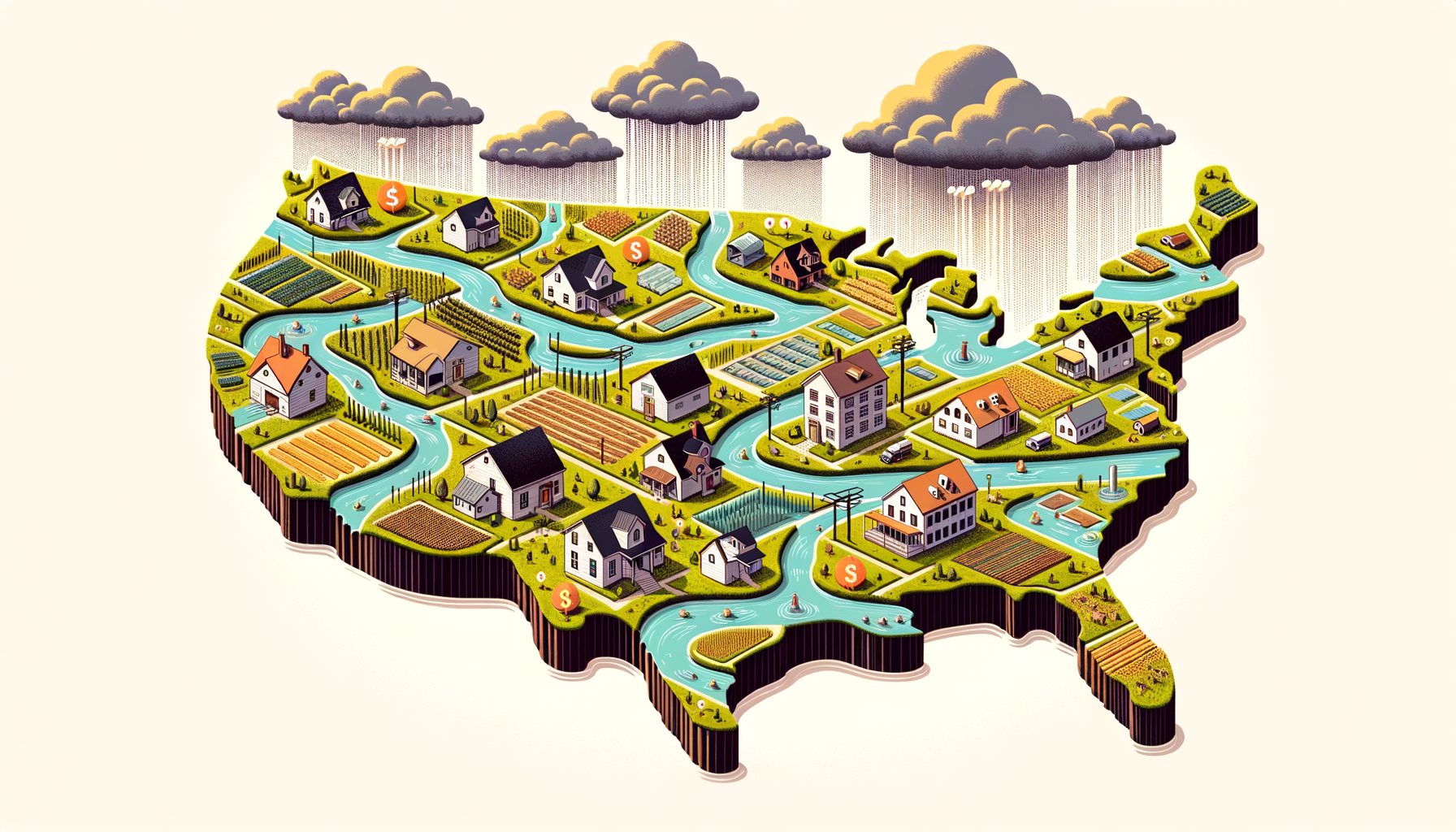“Understanding the Rising Housing Costs in the Midwest Due to Increased Flooding Risks”
The United States Midwest is currently grappling with an increasingly alarming concern – the escalating risk of flooding. This looming trouble with natural calamities is predicted to significantly impact the housing market in the region, as property owners and investors must prepare for potential increases in housing expenses. Real estate’s central tenet of “location, location, location” has taken on a new dimension with fluid challenges like climate change, where the condition of the environment matters just as much as the local amenities and schools near a residence.
Although the Midwest has historically been known for its abundant agricultural assets, it is also now becoming known for its surging flood risk due to a sustained period of heavy rainfall. The particular conditions of the Midwestern region, combined with the impact of climate change, have resulted in a potential risk hotbed of property damage and economic distress.
Climate change has a multifaceted impact on weather patterns and sea levels worldwide. One extensive consequence is that heavier rainfall and a change in precipitation patterns are occurring more frequently, especially in the Midwest—a region already highly prone to flooding due to its extensive network of rivers and floodplains.
Experts have observed that over the past fifty years, heavy rainstorms have increased by 37% in the Midwest. This escalating trend means that standard homeowners insurance may not provide adequate coverage for these “new norm” disasters. As a result, property owners are beginning to wake up to the reality that additional flood insurance may soon be a mandatory consideration in these areas, consequently raising the housing costs.
Property investors, both seasoned and beginners, will need to account for this new requirement in their financial planning. Whereas flood insurance was once a secondary, optional coverage layer, these increased risks mean that in many areas, it may become an essential part of homeownership and property investing.
This increased requirement for flood insurance will invariably create a ripple effect on rental yields and home prices. As premiums rise, landlords may find it necessary to review rental charges to share the financial burden with their tenants. Alternatively, homeowners may discover that the costs associated with increasing flood insurance premiums affect the overall profitability of owning a home, resulting in an alteration of home prices. In both instances, the dramatic increase of flood hazards is profoundly impacting the real estate market in the Midwest.
It’s crucial to understand that this isn’t just a ‘flooding issue.’ It’s a climate change issue. The increasing frequency of natural disasters, not only in the Midwest, poses a significant threat to housing markets all over the United States. With our weather system becoming increasingly unpredictable and, in some cases, even volatile, every corner of the country is at risk.
Unforeseen natural disasters, and the financial consequences they bring, can be unfavorable, creating linkage to job loss, foreclosure, and even eroding mental well-being. The financial implications are especially pronounced for low-to-moderate-income families. The burden placed on these households is disproportionately high, given their often limited options for affordable accommodation within their area and existing insurance limitations.
Property owners and investors need to reevaluate their current investment strategies due to the potential significant impact of these surging flood risks. Protecting real estate investments from a changing climate will require a portfolio in-depth risk screening. This scrutiny not only includes an assessment of the physical risks to a property but also the property’s social and economic outlook in the context of climate change.
Investors will need to be savvy, extracting as much geographical, environmental data as possible and understanding the insurance landscape and regulations that could be potentially subject to change. Engaging with real estate and insurance experts who are knowledgeable about climate change impacts could prove extremely beneficial in this scenario.
To respond to this growing risk, state and federal agencies are actively involved in mitigating the potential damages and associated costs. The Federal Emergency Management Agency (FEMA) has undertaken the mammoth task of updating their outdated flood maps. These maps are crucial, as they help homeowners and insurers assess the flood risk for specific properties accurately.
Newly released by the non-profit organization First Street Foundation is a new flood model, which provides a more comprehensive risk picture. By aggregating millions of data points across the country, it offers a more detailed insight into the risks associated with flooding in the various regions.
Community initiatives also play a critical role in managing this escalating risk. Evidence of this proactive participation includes the work of neighborhood organizations in advocating for proper city management of stormwater, thereby decreasing the risk of urban flash flooding.
In the face of this climate change challenge, real estate investment can still thrive. However, being realistic and informative about the issues at hand is crucial. As investors, an understanding and proactive approach to these changes will be pivotal in building a more sustainable and resilient real estate portfolio.
In conclusion, while the extreme weather conditions and flooding risks in the Midwest certainly pose challenges to the housing market stands, they also offer an opportunity for real estate investors, homeowners, and policymakers to be better prepared for future catastrophes. This proactive stance in response to these mounting challenges will better equip homes, rental properties, and investments to withstand the possible upheaval that our shifting climate can bring.

